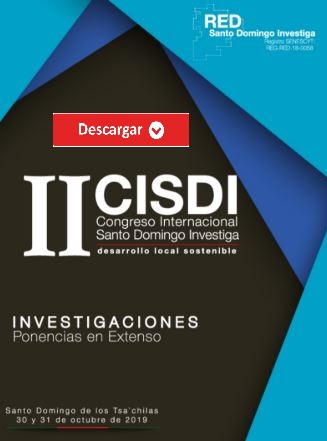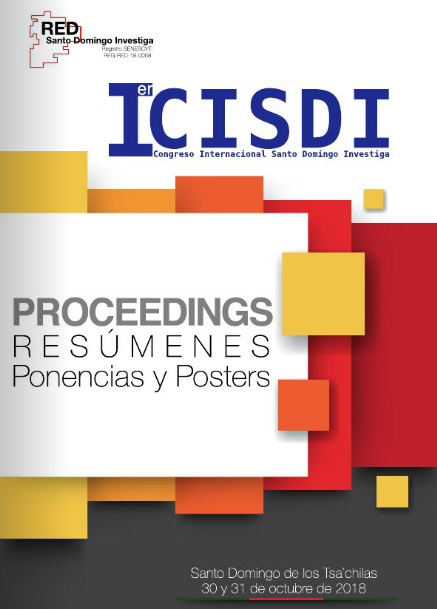EVALUACIÓN DE LAS C,ARACTERÍSTICAS DEL MUCÍLAGO DE CACAO (Theobroma cacao L.) EN LA OBTENCIÓN DE ALCOHOL ETÍLICO
EVALUATION OF THE CHARACTERISTICS OF THE COCOA’S MUCYLAGO (Theobroma cacao L.) IN THE OBTAINING OF ETHYL ALCOHOL
Alejandra Zambrano
Esta dirección de correo electrónico está protegida contra spambots. Necesita activar JavaScript para visualizarla.
Universidad de las Fuerzas Armadas ESPE
Cinthya Vera
Esta dirección de correo electrónico está protegida contra spambots. Necesita activar JavaScript para visualizarla.
Universidad de las Fuerzas Armadas ESPE
Resumen
El objetivo de este trabajo fue evaluar las características físico químicas del mucílago de cacao con el fin de frenar el desperdicio y lograr aprovecharlo convenientemente en la elaboración de alcohol etílico.
Se utilizó un esquema trifactorial (Variedades: CCN-51 y Nacional; Microorganismos fermentativos: Flora natural y Levadura; Esterilización: Pasteurizado y Sin pasteurizar) conducido en un D.C.A. Se procedió a extraer las almendras de las mazorcas de cacao para la obtención del mucilago de las mismas; posteriormente se procedió a realizar un tratamiento térmico del mismo, con el objetivo de evitar proliferación de microorganismos, e inmediatamente después se adicionó azúcar para obtener 21° brix y se adicionó posteriormente levadura 1g por litro. Se colocó el mosto en botellas de color oscuro y se dejó fermentar 21 días. Después de transcurrido este tiempo se procedió a filtrar el mismo para evitar problemas con la destilación y a continuación se inició a destilar el mismo a 75°C por aproximadamente 2 horas.
Como resultados de la caracterización del mucílago se obtuvieron los siguientes datos:
|
Parámetros |
Unidad |
Nacional |
CCN-51 |
|
Acidez titulable |
% |
0,49 |
0,5 |
|
Ph |
3,63 |
3,22 |
|
|
Proteína |
% |
1,7 |
1,2 |
|
Humedad |
% |
85,74 |
81,76 |
|
Materia Seca |
% |
14,26 |
18,24 |
|
Grasa |
% |
0,17 |
0,125 |
|
Sólidos solubles |
° Brix |
15 |
18 |
|
Densidad |
g/cm3 |
1,03 |
1,06 |
Como resultado de los tratamientos aplicados, según el análisis estadístico con la prueba de Tukey se obtuvo que no hay diferencia significativa entre la interacción de la tres variables aplicadas (variedad, microrganismos fermentativos y esterilización) para la variable evaluada de rendimiento, mientras que la interacción entre las variables microrganismos fermentativos y esterilización si tuvo diferencia significativa, obteniendo como resultado más alto la interacción entre flora natural y sin pasteurización con un 19,265% de rendimiento final, y la más baja fue la interacción flora natural y pasteurización con un valor de 16,64%.
Para la variable grados alcohólicos el análisis estadístico mostro que no hubo diferencia significativa en la interacción entre las tres variables aplicadas, pero presento diferencia individual para la variable variedades y para la variable esterilización; con un valor de 40,08 °GL para el método de pasteurización y el mismo valor para la variedad CCN-51, y un valor de 45,5°GL para el método sin pasteurización y el mismo valor para la variable Nacional.
El producto final fue alcohol etílico, el cual al realizar los análisis de rastro de metanol se obtuvo negativo para todos los tratamientos, por lo tanto el producto es apto para el consumo humano.
Palabras Clave: (cacao, mucílago, alcohol etílico, microorganismos, grados alcohólicos.)
Abstract
The objective of this work was to evaluate the physical and chemical characteristics of the cocoa mucilage in order to stop the waste and achieve it conveniently in the production of ethyl alcohol.
A trifactorial scheme was used (Varieties: CCN-51 and National, Fermentative Microorganisms: Natural flora and Yeast, Sterilization: Pasteurized and Unpasteurized) conducted in a D.C.A. The almonds were extracted from the cocoa pods to obtain their mucilage; Subsequently, a thermal treatment was carried out to avoid the proliferation of microorganisms, and immediately afterwards, sugar was added to obtain 21 ° brix and then 1g of yeast was added per liter. The must was placed in dark colored bottles and allowed to ferment for 21 days. After this time elapsed, it was filtered to avoid problems with the distillation and then it was started to distill it at 75 ° C for approximately 2 hours.
As results of the characterization of the mucilage the following data were obtained:
|
Parámetros |
Unidad |
Nacional |
CCN-51 |
|
Titrable acidity |
% |
0,49 |
0,5 |
|
Ph |
3,63 |
3,22 |
|
|
Protein |
% |
1,7 |
1,2 |
|
Humidity |
% |
85,74 |
81,76 |
|
Dry matter |
% |
14,26 |
18,24 |
|
Fat |
% |
0,17 |
0,125 |
|
Soluble solids |
° Brix |
15 |
18 |
|
Density |
g/cm3 |
1,03 |
1,06 |
As a result of the treatments applied, according to the statistical analysis with the tukey test, it was obtained that there is no significant difference between the interaction of the three variables applied (variety, fermentative microorganisms and sterilization) for the evaluated performance variable, while the interaction among the variables fermentative microorganisms and sterilization if there was a significant difference, obtaining as a result the interaction between natural and non-pasteurized flora with a final yield of 19.265%, and the lowest was the natural flora and pasteurization interaction with a value of 16, 64%.
For the variable alcoholic degrees the statistical analysis showed that there was no significant difference in the interaction between the three variables applied, but I present individual difference for the variable varieties and for the variable sterilization; with a value of 40.08 ° GL for the pasteurization method and the same value for the variety CCN-51, and a value of 45.5 ° GL for the method without pasteurization and the same value for the National variable.
The final product was ethyl alcohol, which when performing the trace analysis of methanol was negative for all treatments, therefore the product is suitable for human consumption.
Keywords: (cocoa, mucilage, ethyl alcohol, microorganisms, alcoholic degrees.)

















